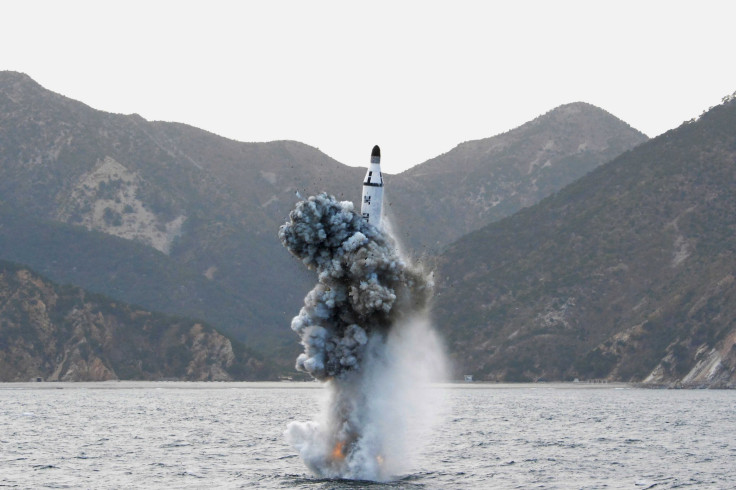North Korea Gearing Up For Musudan Intermediate-Range Ballistic Missile Launch After Failed Attempt On Kim Il-Sung’s Birthday: Report

North Korea is preparing for a test-launch of another intermediate-range ballistic missile, indications show, Yonhap News Agency reported Tuesday, citing sources. World powers have condemned the South Korean rival over its series of missile and nuclear activities — most recently the test-firing of a submarine launched ballistic missile Saturday.
Earlier this month, a test-launch of Musudan intermediate-range ballistic missile, also known as BM-25, failed on the birthday of the country's revered founding leader Kim Il-sung. The country is also reported to have deployed one more intermediate-range ballistic missile on its east coast.
“Signs have been detected that North Korea is trying to launch another Musudan missile after their failed launch that took place earlier on the birthday of Kim Il-sung,” one government source told Yonhap. “The remaining missile appears to be standing by for launch,” the source added.
The South Korean military is keeping a close watch on the launch after it picked up signs that show North Korea “will likely launch the Musudan missile in the near future,” another source told the news agency.
On Saturday, Pyongyang confirmed it successfully test-fired the ballistic missile as tensions continued to mount in the Korean Peninsula. The move attracted criticism from the United Nations Security Council, which called the test a “serious violation” of past resolutions aimed at limiting North Korea’s nuclear ambitions.
“The members of the Security Council agreed that the Security Council would continue to closely monitor the situation and take further significant measures in line with the council's previously expressed determination,” the council said, in a statement. “The members of the Security Council emphasized that the DPRK’s [Democratic People’s Republic Of Korea] development and testing of new ballistic missile capabilities, even if launches are failures, is clearly prohibited by these resolutions.”
North Korean Foreign Minister Ri Su Yong said over the weekend that his country will halt nuclear tests once the United States stops annual military drills with South Korea.
“If we [Pyongyang and Seoul] continue on this path of confrontation, this will lead to very catastrophic results, not only for the two countries but for the whole entire world as well,” Ri said. “It is really crucial for the United States government to withdraw its hostile policy against the DPRK [Democratic People’s Republic of Korea] and as an expression of this stop the military exercises, war exercises, in the Korean Peninsula. Then we will respond likewise.”
However, on Sunday, U.S. President Barack Obama reportedly dismissed the offer, saying Washington would not take the proposal seriously and North Korea would have to do better than that.
Pyongyang, which conducted its fourth nuclear test in January and a rocket launch in February, has threatened to attack the U.S. and South Korea over their joint annual military drills. Although Washington and Seoul have maintained that the drills are for defense purposes, Pyongyang has called the joint exercises a possible cover for a U.S.-led invasion.
© Copyright IBTimes 2024. All rights reserved.






















